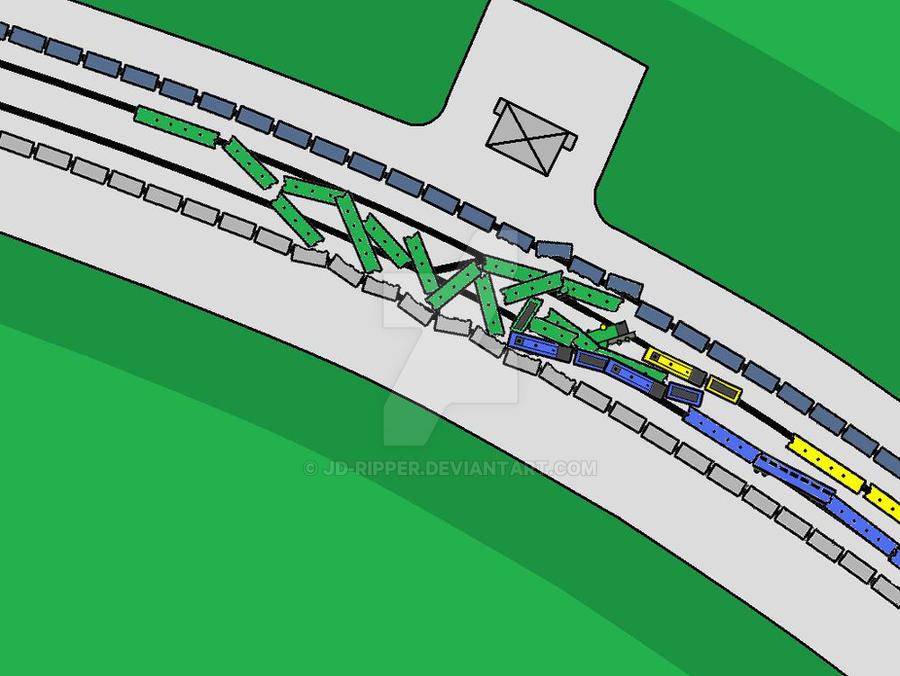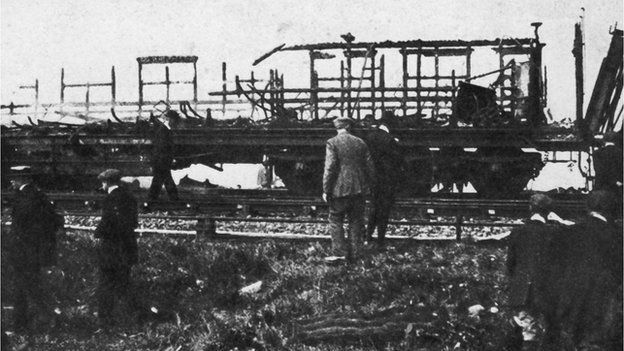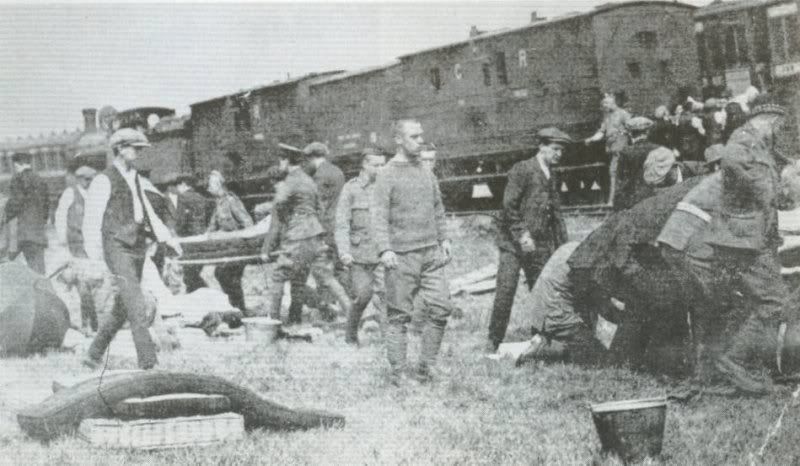Quintishill was the train crash that should never have happened. There were safety regulations in place that should have prevented it from taking place, but due to a catalogue of errors at least 226 died, and 246 were wounded in what remains Britains worst railway disaster.

Quote:
The accident occurred owing to poor working practices on the part of the two signalmen involved; George Meakin, who had worked the night shift, and James Tinsley, who was to work the early day shift. If they had been working according to regulations, then Tinsley would have taken over from Meakin at 6.00 am. The two men, though, had developed an informal arrangement allowing whoever was working the early shift to arrive later. If the local passenger train from Carlisle to Beattock was due to be shunted at Quintinshill then the signalman at Gretna would advise whoever was working the early shift of this and the day signalman would hitch a ride on the local train to Quintinshill, thus saving himself the 1.5 miles (2.4 km) walk from Gretna. To avoid their malpractice being detected by company management, whoever was working the night shift would record all train movements after 6.00 am on a piece of paper rather than record them in the train register. When the day man arrived, he would copy the entries from the paper into the train register, making it appear that the shift change had occurred at the correct time.
On the morning of 22 May the night expresses were both running late so the local train had to be shunted at Quintinshill, and therefore Tinsley took advantage of the free ride on the local train to arrive there at about 6.30 am.
As the goods loop was occupied with the 4.50 am goods train from Carlisle, Meakin decided to shunt the local passenger train onto the Up main line Although not a preferred method of operation, this was not a dangerous thing to do if the proper precautions were taken. Out of the previous 21 occasions that the local train had been shunted at Quintinshill, on four occasions it had been shunted onto the Up line.
On this occasion neither of the important safety precautions were taken. Firstly, Kirkpatrick signal box (the preceding box in the Up direction) was not sent the "blocking back" signal which would have informed the Kirkpatrick signalman that the line was occupied and warned him not to send any more trains towards Quintinshill.
Secondly, the signalman at Quintinshill should have placed a signal lever collar over the relevant signal lever to stop himself from clearing the signal and allowing another train to proceed from Kirkpatrick.
The laxity of the fireman of the local train, George Hutchinson, in carrying out his duties under Rule 55 meant that Tinsley's and Meakin's failures went unobserved. Had Hutchinson carried out his duty correctly, he would have reminded the signalman that his train was standing on the Up main line and would have checked that a lever collar was in place before returning to his train. He did neither, and merely signed the train register, using a pen which Tinsley, who was intent on filling in the train register, handed over his shoulder without looking up, and left the signal box at 6.46 am. Also in the signal box, against the rules, were two other railwaymen (brakesmen from the two goods trains) whose presence may have distracted Tinsley and Meakin who was discussing the war with the two brakesmen.
At 6.34 am one of the signalmen (it was never established who) gave the "train out of section" bell to Kirkpatrick for the coal train which now stood in the up goods loop. After giving train out of section, this was the point at which the "blocking back" signal should have been given to Kirkpatrick but neither man did this.
At 6.38 am the first of the expresses from Carlisle passed Quintinshill heading north.
At 6.42 am Kirkpatrick "offered" the troop train to Tinsley. Tinsley immediately accepted this and four minutes later was offered the second northbound express from Gretna Junction. At 6.47 am Tinsley received the "train entering section" signal from Kirkpatrick for the troop train and offered it forward to Gretna Junction, having forgotten all about the local passenger train which was occupying the Up line. It was immediately accepted by Gretna Junction so Tinsley pulled "off" his Up home signal to allow the troop train forward. Had he placed a lever collar on this signal as he should have done (and as Hutchinson should have checked) then Tinsley would not have been able to pull the signal lever.
The troop train collided head on with the stationary local train on the up line at 6.49 am. Just over a minute later, the second of the express trains ran into the wreckage. The wreckage also included the goods train in the down loop and a train of empty coal trucks in the up loop. At 6.53 Tinsley sent the "Obstruction Danger" bell signal to both Gretna and Kirkpatrick, stopping all traffic and alerting others to the disaster.
|

The results were horrific, many on the trains were killed outright by the high speed collision, and those that survived faced an inferno that would take a day to put out. Exacerbating the problem was the elderly design of the carriages involved, with obsolete Great Central Railway coaching stock being used to ferry the troops due to a rolling stock shortage brought on by the demands of the war. These carriages were lit by gas lamps, the gas for which was supplied from reservoirs underneath the carriage and had recently been topped up at Larbert station. This gas system, coupled with the poor survivability of the carriages meant that what stock didn't crumple up in the impact were totally incinerated.

So hot were the flames that some bodies were never recovered, having been burnt into ashes, and since the roll call of the regiment was destroyed in the fire, no one was completely sure how many of the Scots Guards had been killed. Casualties in the other trains were relatively light, with only two killed in the local train and seven in the express, however two hundred and fifteen soldiers, at least, were killed in the troop train. Four children, their bodies barely recognisable, were recovered from the wreckage but when no-one came forward to report any missing children, they were buried in Glasgows western necropolis on the 26th.

The surviving soldiers were evaluated by the medical board at Liverpool on the 23rd and all the enlisted ranks plus one officer were declared unfit for duty and returned to Edinburgh. In one last tragedy, on their return to Edinburgh they were mistaken for Prisoners of War by local children and pelted.
The two signalmen involved in the accident were found guilty of culpable homicide, Tinsley was sentenced to three years penal servitude, and Meakin to eighteen months imprisonment. Both were released from prison in December 1916, Tinsley returning to work on the Caledonian railway as a lampman and Meakin eventually working as a coal merchant near the scene of the crash in Quintishill.
